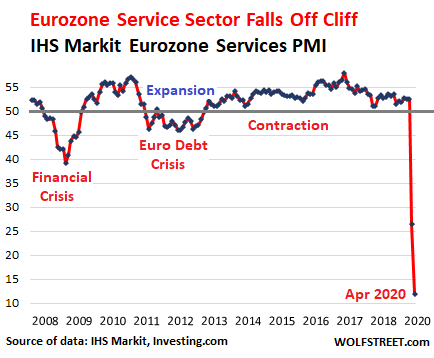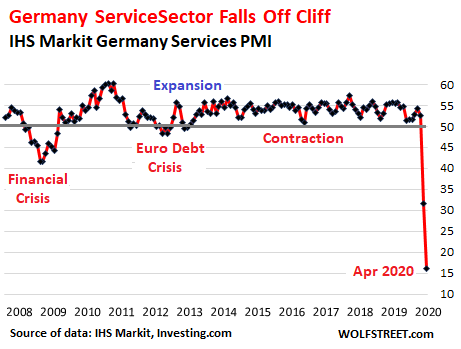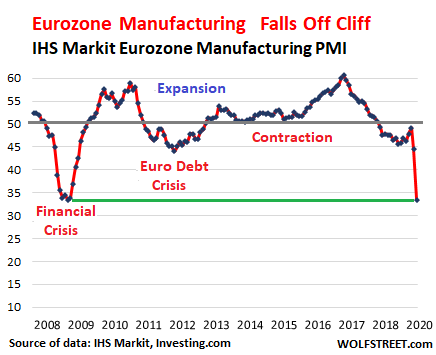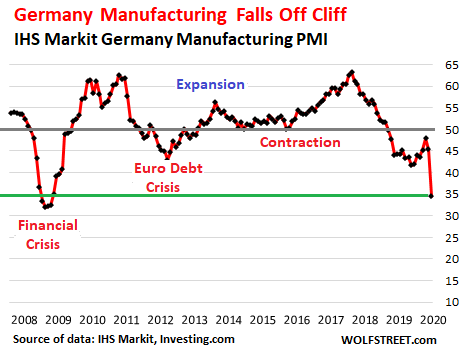It will likely take “several years before the output lost due to the virus outbreak is fully regained.”
By Wolf Richter for WOLF STREET.
“At this stage, we can only tentatively map out the scale and gravity of the coronavirus shock to our economies. While the immediate fallout will be far more severe for the global economy than the financial crisis, the depth of the impact will depend on the evolution of the pandemic, our ability to safely restart economic activity and to rebound thereafter,” the European Commission said in its Spring 2020 Economic Forecast.
The data on services and manufacturing now emerging from the Eurozone is in fall-off-the-cliff mode. This is particularly the case for the service sector – finance, insurance, health care, professional services such as technology, lawyering, or architects, but also transportation, tourism, bars, etc. – has collapsed in spectacular and gut-wrenching fashion.
The IHS Markit Services PMI for the Eurozone collapsed from an all-time historic low in March (26.4) to a catastrophic 12.0 in April. Note the cute little dimple of big-bad Financial Crisis 1, that had bottomed out at 39.2 (below 50 means contraction):

The service sectors of Italy, Spain, and France collapsed by the most – the countries with the most draconian lockdowns, where people were essentially cooped up at home for weeks, in response to some of the worst outbreaks of The Virus. The IHS Markit Services PMI by country:
Italy to 10.8: Driven by a collapse in new orders. The report for Italy said: “Amid the considerable contraction in client demand, firms reduced staffing levels further, with the rate of job shedding the sharpest on record.”
France to 10.2: The report for France pointed out that the executives in the survey “often associated lower output with the temporary closure of their business amid lockdown measures.”
Spain to 7.1: New orders collapsed. Tourism collapsed. The report for Spain said: “Firms were deeply concerned about not only current conditions, but prospects,” with negative expectations about activity over the next year dominating.
In Germany, by far the largest economy in the Eurozone, the lockdowns were less severe than in Italy, Spain, and France, but were similar to California’s lockdowns, with people being encouraged to go outside to exercise (but with social distancing, etc.) and the like. The IHS Markit Services PMI for Germany collapsed to 16.2.
“With many businesses temporarily closed, and demand stifled by a wait-and-see attitude among consumers and firms alike, inflows of new work across the German service sector fell sharply in April,” the report said. Also note the cute little dimple during Financial Crisis 1:

Manufacturing activity also plunged across the Eurozone in a cliff-dive manner. The IHS Manufacturing PMI for the Eurozone: “Output, new orders, export sales, and purchasing activity all fell at record rates, whilst supply side constraints intensified to an unprecedented extent. Confidence about the future sank to a fresh series low.”
But unlike the Eurozone Services PMI, the Manufacturing PMI has not yet annihilated the low of Financial Crisis 1, but in April merely eked out a new record by a hair, with a new low of 33.4:

In some countries, the IHS Manufacturing PMIs in April haven’t taken out their Financial Crisis lows, but in other countries, the PMIs plunged to new record lows:
- Netherlands: 41.3 (lowest since 2009)
- Ireland: 36.0 (lowest since 2009)
- Germany: 34.5 (lowest since 2009)
- Austria: 31.6 (all-time low)
- France: 31.5 (all-time low)
- Italy: 31.1 (all-time low)
- Spain: 30.8 (lowest since 2009)
- Greece: 29.5 (all-time low)
In Germany, whose economy is heavily dependent on manufacturing, and on exports of manufactured goods, the IHS Manufacturing PMI for April dropped to 34.5. This was 2.5 points above the low in December 2008 during the Financial Crisis.

But new orders for German manufacturers collapsed at record pace, outpacing the collapse of orders during Financial Crisis 1. IHS Markit reported: “Customer closures, supply disruption and uncertainty leading to order cancellations or postponements all contributed the drop in new business volumes. Exports sales fell even faster than overall new orders, reflecting particularly weak demand from Italy, France, Spain and the US.”
In terms of jobs, it’s also getting ugly, though within the rules of the German labor market: “The pace of staff cuts across the manufacturing sector gathered pace in April, reaching the quickest seen since May 2009. Alongside reports of redundancies, reduced contractor numbers and natural wastage, there were also frequent mentions of the use of short-time working [Kurzarbeit, a form of reduced hours, subsidized by the government] to avoid job cuts.”
For the Eurozone overall, as countries are beginning to ease the lockdowns and allow for more economic activity, governments “juggle between reviving economies and preventing a second wave of infections.” In this scenario, “most companies will inevitably need to work at levels well below full capacity and sectors such as retail, travel, tourism and recreation – already the hardest hit – will continue to be badly affected by social distancing.”
As economies are gradually climbing out of the hole, IHS Market expects that it will likely take “several years before the output lost due to the virus outbreak is fully regained.”
Commercial real estate is already feeling the pain. “Wide bid-ask spread points to lower values” going forward. It just started. Read... Commercial Real Estate Already Gets Hit in Europe: Prices for Retail Properties Plunge, Office Prices Sink
Enjoy reading WOLF STREET and want to support it? You can donate. I appreciate it immensely. Click on the mug to find out how:
![]()


Is the pot industry taking a big hit?
I will give you a blunt answer.
“Grass” is always green.
Sales are “high”…
Europeans really need to create a number of alternatives to US tech companies.
Good point. But go bigger. We all need to bring manufacturing back: More Jobs. More Tax revenues (labour and corporate). Lower social costs. More efficient use of government essential services (esp education, etc). Better and more reliable product quality. Improved national security too. Smoother supply chain. Same product price. More equitable income inequality.
What? And reduce the number of lawyers and liberal arts majors specializing in Shakespeare? How uncivilized, next I suppose you will want to reduce the number of independent journalists out there telling the truth.
No, repeat after me, manufacturing is not a value added task. It is what we have been taught to believe in by school. High paying service jobs are the way to the future….
OMG, if I repeat that enough, it actually sounds believable.
There’s a manufacturing philosophy called “lights out”. Very much like TPS it was invented by a Japanese company, in this case FANUC.
“Lights out” means the manufacturing process is completely automated and can run 24 hours a day, 7 days a week without humans doing absolutely anything.
In short so much for those supposedly well paid manufacturing jobs.
Multinational manufacturing companies like Toyota have been flip-flopping a lot about automation over the past decade, partly because in TPS human presence is deemed essential to improve manufacturing efficiency and partly because in countries like South Africa and Thailand the combination of tax incentives and low wages is competitive with automation.
But in highly developed countries like Germany, Japan or the US automation is the way forward in manufacturing and as industrial robots become more and more capable expect the revolution to be slow, then sudden.
“Lights out” manufacturing poses all sorts of intriguing questions. For example a lights out factory in Austria could be simply dismantled, put on lorries and re-assembled in Germany, Switzerland, Slovakia… basically any other country that offers better incentives. Same thing with different US States. Since there’s nobody to fire bar perhaps the night watchmen this stuff could happen overnight with politicians barely understanding what’s going on.
We have them.
Stacks of them. No joke. But you hold on them in the face of a wall of private equity….
I am amazed that the global economy has not completely collapsed.
If you want to see total collapse look at Las Vegas, NV. 50% unemployment, no prospect of opening the casinos any time soon and local governments laying off hundreds of employees, already. De facto rent strikes and food banks unable to keep up with demand. Oh, I forgot. Fearless Leader told us to shoot up Lysol, drink bleach and all will be well with the world.
Wolfe:
“Fall-off-the-cliff mode”, is a great description for “vertical red straight lines”!
Maybe the everything bubble going to heck does “fall-off-the-cliff”!
Will Germany get tired of supporting the step sisters, start it’s own divorce from the EU?
Maybe Germany leads it own exit and takes a few sisters with her creating a new union.
People who live and evolved in warm climates have a far different culture than people who live and evolved in cold climates. That is a fact. You cannot change tens of thousands of years of evolution by forming an artificial union. That is probably the driving factor in immigration policy, to attempt to equalize the cultures, but like most everything man does to gain total control, it will fail.
I shall stop you right there.
Cold wet moors have produced the best of works..
Such as, parhaps, the boy Brontë’s ‘Wuthering Heights’.
Ok, I retract my last post. Didn’t read you point thoughly enough.
I’m sorry, but I’ll call “bullsh*t”. There is no “evolutionary difference” between southern and northern Europeans. Italy, for example, is full.. I say FULL, of decendents of Lombards, Swabians, Tyroleans. Let’s not forget the Normans..who were Vikings, fer chrissakes, who settled in Sicily! (Blond Sicilians are many!)
This whole virtuous Northerner, profligate Southerner is just a load of you-know-what. I’ll trade you a Treviso businessman for a dour Dutch banker anytime!
You should create an economic meltdown measurement like that ‘other Richter’ who did it in seismology.
You know a logirithmic economic calamity scale. “OMG it’s 7.8 on the Richter scale!”
?
Bug in the rug, to me, is Ireland.
Frothy recovery after last crisis. Not necessarily based on sustainable, locally loyal, fundamentals.
An economy to quietly watch.
I can see governments preparing the tax haven signs to put on their borders. The lowest bidder wins the grace of Chinese companies.
Wolf,
Fattening up my squirrels, just in case.
“It will likely take “several years before the output lost due to the virus outbreak is fully regained.”
And that’s only if we don’t have another lockdown or a continued series of lockdowns. Things can bounce back in time, no doubt but it won’t if businesses are forced to shutdown over and over again. With just one shutdown we have Hertz, Lord and Taylor, JC Pennies and a host of other companies on the verge of bankruptcy.
You’re right!
Economies are climbing out of the ‘whole’ ?
Wolf please make a special mug which does confirm that things can in fact go to heck in a straight line (where government is involved).
As I drive around in my Amazon van, I sometimes feel like I am participating in the latest reality TV show.
The prevailing attitude seems to be “This is so much fun, I don’t have to work and I get to wear a mask.”
The idea, that things could get much, much worse is nowhere to be found.
Not where I live. People do take all of this very seriously. We have some nurses in our local community who I’ve heard saying on several occasions that dying from COVID-19 is a very nasty business. One of them working in a university hospital nearby said about those who don’t make it, and I quote: “basically, they’re suffocating.”
No vaccine in the foreseeable future equals an extended economic slowdown, possibly of epic proportions. As people will become ever more knowledgeable about this virus and how it can affect them, they will become less inclined to resume business as usual.
Sorry, I was speaking from an economic standpoint as I feel things could get much worse economically.
I live in a society that is priced to perfection and this does not appear to be understood by the masses.
The US cannot afford to be down for a week or a month and definitely not for months or years..
Reality can be brutal!
The big problem I see around here is the construction industry. They have been allowed to re-open just on Monday and they are already violating every single common-sense rule in broad daylight. And nobody is checking on them, differently from manufacturing and retail where controls have been intensive to say the least with very heavy penalties for any violation.
Normally I’d say if they want to get sick, let them. But if these idiots get sick it’s us who get locked down. And it’s just a matter of time.
To add insult to injury new cases around here are overwhelmingly very mild in nature so these idiots will get two paid weeks on sick leave while they stay at home drinking beer, watching TV and laughing on the phone with their mates. In the meantime we’ll get a few more weeks of hard lockdown.
So, yes, for some people this is so much fun. For the rest of us the misery hasn’t even started yet.
Logan’s Run…
A weird show, I still remember being broadcast back in the early 70’s
The citizens live a hedonistic life but, to prevent overpopulation, everyone must undergo the rite of “Carrousel” when they reach the age of 30
Where are we today?
24 Trillion does not sleep as it must be fed…
Shut it all down and who is going to feed the beast?
Take off the masks, they don’t work anyway!